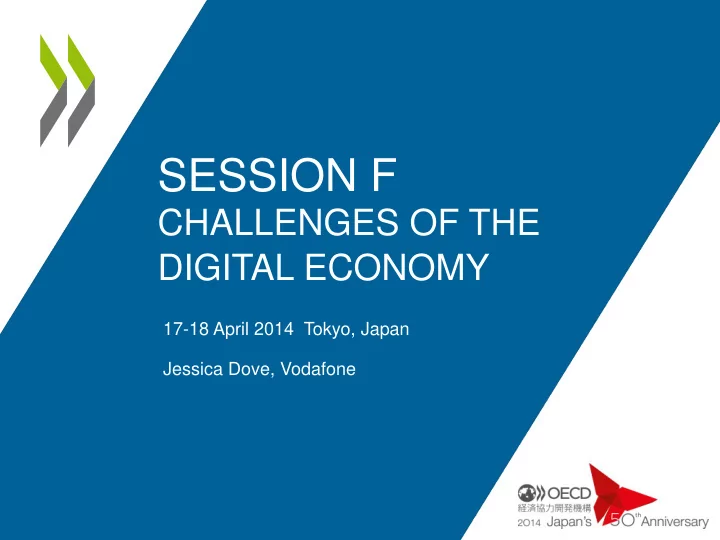

SESSION F CHALLENGES OF THE DIGITAL ECONOMY 17-18 April 2014 Tokyo, Japan Jessica Dove, Vodafone
• The nature of digital economy means that it is possible for suppliers to make supplies to customers in jurisdictions where they have no other presence • In scenario 1 of the case study, the place of taxation for Company D’s supplies is assumed to be in Country B • Challenges for Company D may be: Understanding the registration rules – – Filing the registration and managing the registration process – Filing returns remotely and making payment remotely and in foreign currency – Language barriers – Detailed rules applicable – taxpoints, price adjustments, bad debts, invoicing, etc Understanding and managing the wider tax system, such as appeals processes, rulings – etc. – How to evidence the assessment of customer residence – Setting up systems to cope with the complexity 2
• In scenario 2 of the case study, again, the place of taxation for Company D’s supplies is assumed to be in Country B • The challenges are similar as for scenario 1. In particular, assuming Company D is the supplier, his challenge is to determine where his customer is resident • Business-relevant indicia will be important as a solution • However, in scenario 2 there is additional complexity for both Company D and for the tax authority in determining who the supplier is: – May depend on contractual arrangements between the Telco and Company D May be dictated by practice in Country B e.g. the Telco may be deemed to be the – supplier in all cases – Lack of clarity may be complex to unravel and audit • Scenario 3 illustrates the questions that may arise as to where consumption takes place. It also illustrates the fact that Company D may not be in control of where his customers are. 3
• Scenario 3 illustrates the questions that may arise as to which proxy is most appropriate to ensure that the place of taxation aligns with consumption • Arguably consumption is still taking place in the location of customer residence particularly as the film may be watched again when the customer returns home • From a practical perspective, how would Company D know where Consumer C was when they downloaded the film – what additional information does he have? • Assuming that the place of taxation is in Country B therefore, the questions around collection of tax are therefore similar as for Scenario 1 4
Notwithstanding the challenges discussed, vendor collection • (supplier registration) appears at present to be the most effective method of collecting tax in such scenarios • However, from a business perspective, it is important that the burdens are off-set using appropriate registration thresholds. Simplified registration procedures may also be useful • Registration thresholds in particular are important to ease the high administrative burden that would otherwise arise from making ‘accidental’ or occasional supplies to foreign customers outside the control of the supplier • Other forms of tax collection, such as customer self- assessment, use of intermediaries and automated systems may offer alternatives in the future, as technology advances 5
• Advancing technology can assist business and governments in terms of making it easy for businesses to comply. The following are examples: – the use of web portals for registration and for filing of returns/payments – easy to access online information about thresholds, deadlines, contact details 6
Recommend
More recommend